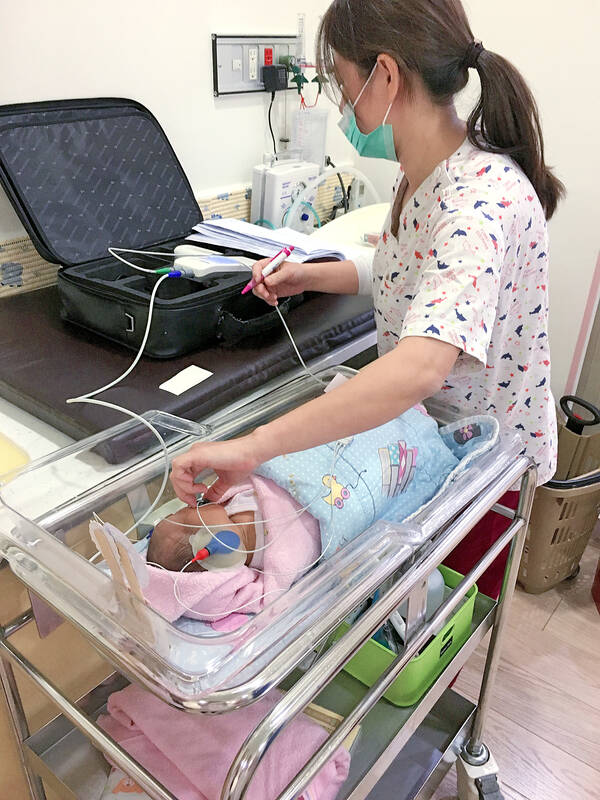Each year, about 800 babies are born with hearing impairment in Taiwan, the Health Promotion Administration (HPA) said on Monday.
Newborns usually receive a hearing screening within 24 hours of birth, and those with impairment would be referred to treatment and intervention services, it said.
An infant, identified by the pseudonym Hsiao-li (小立), who was born in spring this year, underwent a hearing screening on the second day after birth, but failed two tests before being discharged from the hospital, it said.

Photo courtesy of the Tainan Public Health Bureau
Following further examination, Hsiao-li was diagnosed with hearing loss.
Hsiao-li’s mother said that the diagnosis was a big blow to her, but she sought treatment for her child, and Hsiao-li began wearing hearing aids at three weeks old.
Hsiao-li started receiving hearing loss intervention courses at six months old.
The mother said that when her child first heard a sound, they opened their eyes wide, smiled and made an “ah” sound, and she shed tears of joy.
“I’m so glad that we received the hearing screening and were able to help Hsiao-li as early as possible,” she said.
HPA Maternal and Child Health Division chief physician Hu I-chun (胡怡君) said if children with congenital hearing loss are diagnosed early in life, and receive speech and language therapy, they can have normal physical and mental development.
This way, they can develop their language and social skills, which would be beneficial to them in school life, Hu said.
If they miss the critical treatment period, they might have speech delay and encounter learning difficulties, and it might even affect their emotions and social skills, she said.
Since the HPA began offering publicly funded hearing screening services to children younger than three months, the coverage rate has been above 90 percent, one of the highest in the world, she said.
Children with mild-to-moderate hearing impairment do not always have obvious speech problems, and can be easily neglected, so hearing screenings for newborns are very important, especially if they are in the high-risk groups, she said.
High-risk groups include those who have a family history of hearing impairment; those who were born premature, weigh less than 1.5kg, lack enough oxygen circulating in the brain, or have bacterial meningitis or congenital malformation; and cases in which the expectant mother contracted Rubella or other viral diseases in the first stage of pregnancy, or had used ototoxic drugs, she added.
The HPA said 260 healthcare facilities across the nation offer the newborn hearing screening service, and 66 of them also have further examination for hearing loss or impairment diagnosis.
However, even if a newborn passes the screening, it does not guarantee that the child’s hearing development would always be normal, as in some cases, children could develop progressive hearing loss or have hearing issues caused by otitis media, injuries or meningitis, it added.

SHIPS, TRAINS AND AUTOMOBILES: The ministry has announced changes to varied transportation industries taking effect soon, with a number of effects for passengers Beginning next month, the post office is canceling signature upon delivery and written inquiry services for international registered small packets in accordance with the new policy of the Universal Postal Union, the Ministry of Transportation and Communications said yesterday. The new policy does not apply to packets that are to be delivered to China, the ministry said. Senders of international registered small packets would receive a NT$10 rebate on postage if the packets are sent from Jan. 1 to March 31, it added. The ministry said that three other policies are also scheduled to take effect next month. International cruise ship operators

HORROR STORIES: One victim recounted not realizing they had been stabbed and seeing people bleeding, while another recalled breaking down in tears after fleeing A man on Friday died after he tried to fight the knife-wielding suspect who went on a stabbing spree near two of Taipei’s busiest metro stations, Taipei Mayor Chiang Wan-an (蔣萬安) said. The 57-year-old man, identified by his family name, Yu (余), encountered the suspect at Exit M7 of Taipei Main Station and immediately tried to stop him, but was fatally wounded and later died, Chiang said, calling the incident “heartbreaking.” Yu’s family would receive at least NT$5 million (US$158,584) in compensation through the Taipei Rapid Transit Corp’s (TRTC) insurance coverage, he said after convening an emergency security response meeting yesterday morning. National

PLANNED: The suspect visited the crime scene before the killings, seeking information on how to access the roof, and had extensively researched a 2014 stabbing incident The suspect in a stabbing attack that killed three people and injured 11 in Taipei on Friday had planned the assault and set fires at other locations earlier in the day, law enforcement officials said yesterday. National Police Agency (NPA) Director-General Chang Jung-hsin (張榮興) said the suspect, a 27-year-old man named Chang Wen (張文), began the attacks at 3:40pm, first setting off smoke bombs on a road, damaging cars and motorbikes. Earlier, Chang Wen set fire to a rental room where he was staying on Gongyuan Road in Zhongzheng District (中正), Chang Jung-hsin said. The suspect later threw smoke grenades near two exits

The Forestry and Nature Conservation Agency yesterday launched a gift box to market honey “certified by a Formosan black bear” in appreciation of a beekeeper’s amicable interaction with a honey-thieving bear. Beekeeper Chih Ming-chen (池明鎮) in January inspected his bee farm in Hualien County’s Jhuosi Township (卓溪) and found that more than 20 beehives had been destroyed and many hives were eaten, with bear droppings and paw prints near the destroyed hives, the agency said. Chih returned to the farm to move the remaining beehives away that evening when he encountered a Formosan black bear only 20m away, the agency said. The bear